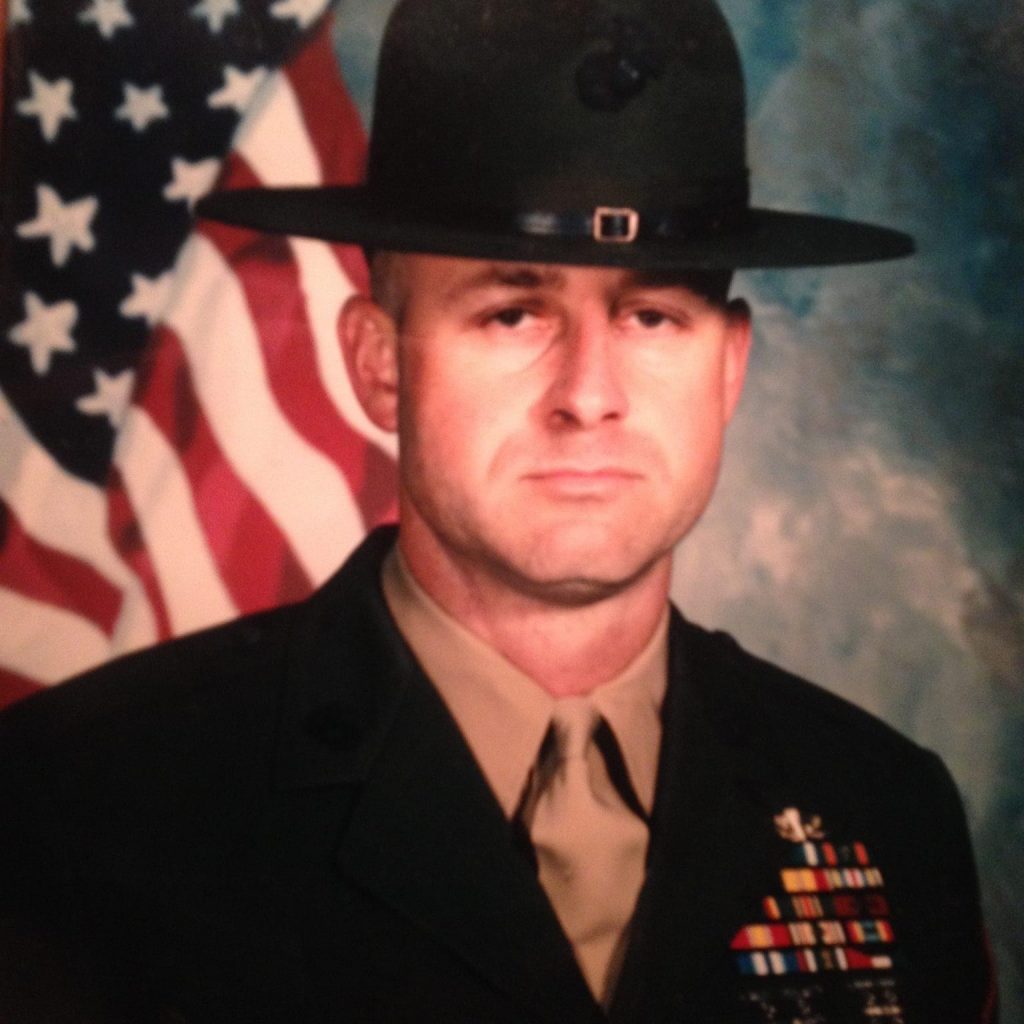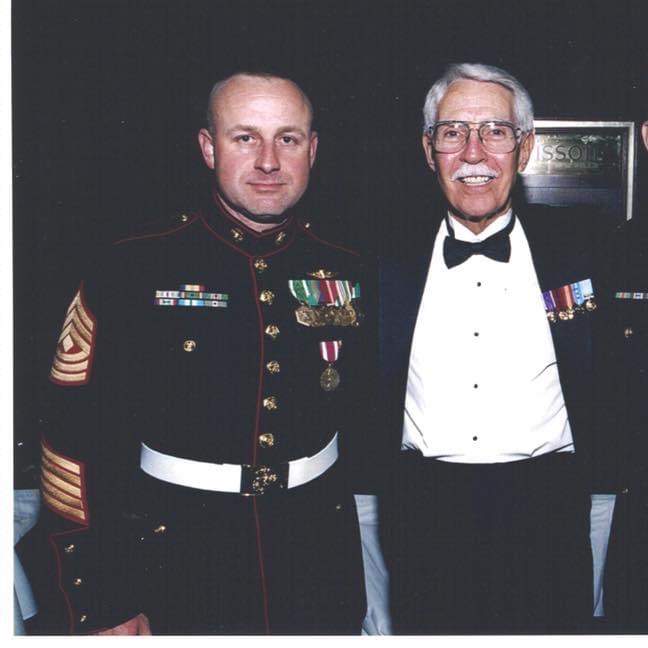Marine Corps training stays with Y-12’s chief of protective forces
Christopher Seals has never quite gotten the sound of John Wayne’s voice out of his head.
The iconic actor made such an impression on the 18-year-old Hawkins County native that he found himself in the local U.S. Army recruiting office right after high school graduation in 1979.
“I wanted to be a Green Beret. I wanted the challenge,” said Seals, a nearly 22-year U.S. Marine Corps veteran and chief of protective forces at Y-12 Security Complex in Oak Ridge. But when Seals told the Army recruiter he wanted to be a “Beret,” the recruiter had another idea: choose something technical like a military occupational specialty.
“I wanted to experience far-off lands and adventure,” said Seals.
Next stop was the U.S. Marine Corps recruiting office.
“I had seen Sands of Iwo Jima with John Wayne. Lots of heroic actions, and then there were the Americans raising the flag,” Seals said.
“When you’re 18 you think you’re bullet-proof.”
By September 1979, he was on his way to boot camp in Parris Island, S.C. Seals saw a lot of recruits at Parris Island buckle and go home.
“It was rough. But I was a 150-pound skinny dude, so I was in pretty good shape. I stayed and made it through training, and was excited in 1980 when I got to go to communications school for radio operators in California.
“I thought I’d hit the jackpot.”
From there, Seals received orders for Okinawa, Japan. He saw Thailand, South Korea, the Philippines and mainland Japan.
“Seeing more of the world helped me realize just how lucky I was as an American,” he said.
When he transferred in 1981 to Camp Lejeune, N.C., Seals soon made private 1st class and advanced to sergeant. By 1986, he was staff sergeant. When he headed back to Parris Island in 1995, he was 1st sergeant.
Leadership duties also came early for Seals. In 1984, he became a drill instructor for new recruits at Parris Island. “It was a very tough school, and I was only 23 years old, training people and seeing them transform from civilian life to military,” Seals said. He often worked 100 hours a week.
In 1983 for the first time in his life, Seals lost buddies from his unit in the bombing of Beirut. He had been slated to go to Beirut but received other orders to Parris Island.
“I remember it to this day, watching the names come across the television screen,” he said. “It was my first time to know anyone who died in combat.”
By 1990, Seals had served during Desert Shield and Desert Storm as part of the 4th Marine Expeditionary Brigade.
“The welcome we got at Camp Lejeune after Desert Storm in 1990 was unbelievable,” Seals remembers. “That kind of welcome is something that means so much to our troops forever. It always will.”
In 1992, he became part of the 2nd Air-Naval Gunfire Liaison Company. Located at Camp Lejeune, ANGLICO is a special observational unit and one of the few in the Marine Corps in which members get to attend jump school. During his five years with ANGLICO, Seals earned his American, British and Canadian jump wings.
“It was a big deal and a bit of a thrill to be able to do this.”
ANGLICO’S primary mission is providing support to units who are fighting adjacent to the Marines. Part of the mission was working with the Army 82nd Airborne, a rapid deployment parachute assault division, and the 75th Rangers, an elite special operations force. As specialized forward observers, members would call in ground support such as artillery, mortars, rotary and fixed-wing air support, and naval gunfire.
“We worked with many NATO countries –- Turkey, Germany, UK –- any ally that fought alongside the Marines could get our support.”
By 1999, after nearly 22 years at Parris Island, Seals retired as 1st sergeant, serving his last two years in the Knoxville Reserve Unit.
“I had been taking my daughter Catherine to so many places. She was 11 when I retired and was used to moving around, but getting to come to East Tennessee was great for both of us.”
As 1st sergeant at the Knoxville Reserve Unit, Seals was the senior enlisted advisor to the commander. He also took care of funeral details and casualty or “death” calls.
“If a Marine on active duty gets killed, it was my job to contact the family. This is such an important part of our work,” he said. “We always notify the next of kin in person, and we stay with them for as long as they want you there.”
“No casualty call is ever the same,” Seals said, quietly.
And if recruits became suicidal or wanted to hurt themselves, Seals was in charge of attending to this, talking with them and ultimately sending the recruit home if needed.
Seals went straight from military retirement to Y-12 in 2001, starting a new career as a security police officer.
Then came the attacks of Sept. 11.
“Before 9/11 we carried revolvers. After 9/11 hit, everything in security changed. Support poured in,” he said.
Officers went from carrying standard rifles to machine guns. Grenades and cutting-edge weapons became standard equipment, and the number of officers increased. Seals was selected as lieutenant and then promoted to captain.
In 2012, an unprecedented event shook the nuclear storage facility.
“We had a breach by a nun,” said Seals.
In July 2012, an 82-year-old Catholic nun named Megan Rice and two fellow anti-nuclear activists broke into Y-12, one of the U.S. government’s most secure facilities. They were convicted in 2014 of sabotaging the plant. All three were members of the Plowshares movement of Christian pacifists.
The security breach drew worldwide attention, and fallout from the break-in was swift. In addition to increasing patrols, several staff changes occurred in the security department. Seals was selected as the new chief of protective forces and quickly worked to help raise morale and performance.
“Even though nothing was ever at risk from that breach, the pride factor was low,” he said.
Eighteen months after the breach, Protective Services’ several hundred employees achieved a paradigm shift under Seals’ leadership. He raised the game.
“We changed the way we trained and improved our mindset for what we had to do here,” he said. “We got back to the basics. We trained and trained and trained. And we got better and better and better.”
Today, security at Y-12 is top rated. Under Seals, the department has “aced” DOE-arranged Enterprise Assessment inspections, in-depth audits of facilities nationwide, completed every few years.
“This improvement happened because of the people around me. I feel so good about being a part of this and where we have all come as a team.”
Seals says he is fortunate to have an excellent pool of diverse applicants. Y-12 has supported hiring elite men and women specialists from Navy Seals, Army Rangers, Army Special Forces, Airforce Security Police, Marine Reconnaissance and other military units.
Today, Seals and his wife, Julie, live in Harriman on the Emory River. Seals describes his military career with U.S. Marine Corps as invaluable in his journey to becoming who he is today.
Perhaps most of all, the Marines provided him the place to learn leadership—literally from day one.
“From the minute you get into the Marines you get drilled on leadership. So much of my training has stayed in my head all these years, and I use it today,” said Seals. “Like understanding that indecision is decision.”
And Seals still hears the voice of John Wayne in his head now and then.
“My dog is named Duke,” he says, smiling. “I watch John Wayne every chance I get.”



Comments are closed.